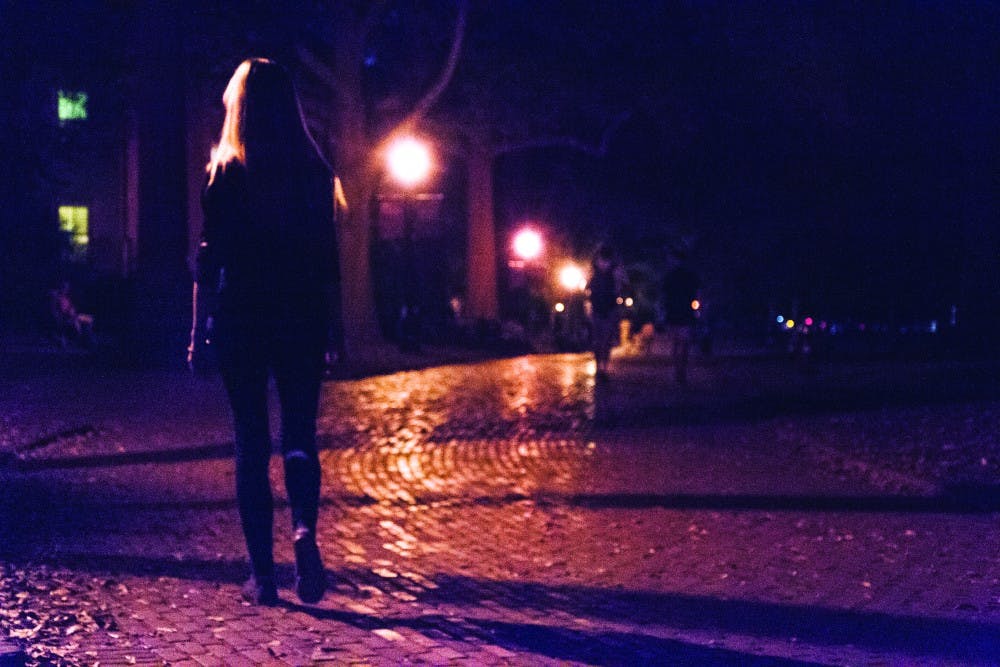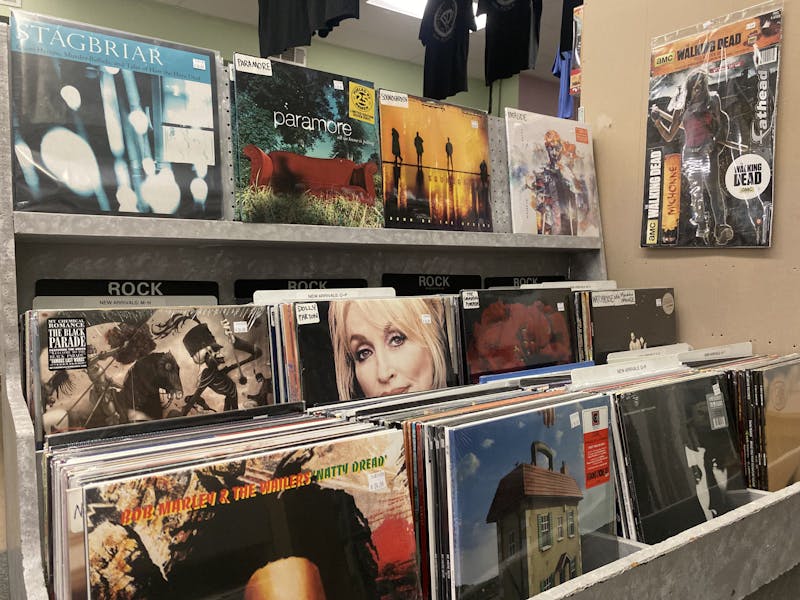Sarah Card* was walking from the USC campus to Five Points with friends around 10 p.m. on a Thursday night in September when three men surrounded them and demanded they get on the ground. At gunpoint, the men demanded the students hand over their valuables while Card, hiding her phone under her chest, began to dial 911.
Card and her friends were ultimately unharmed in the incident. One of her friends didn’t have anything stolen, and Card kept her cell phone. The three men were arrested within 24 hours of the Columbia Police Department releasing stills from surveillance footage, which caught the crime from all angles.
Card remembers saying to a friend earlier that same day that she didn’t feel unsafe on campus or in Five Points at night.
“I said, ‘It’s just cops and students; why should I be afraid?’” Card says.
Card and her friends took many of the precautions often encouraged for people—especially young women—to consider when out at night. She was in a group, walking on a well-lit and moderately trafficked route close to homes and businesses. The robbers struck when the women were on the 1800 block of Greene Street, two blocks from Five Points and four from Russell House. Just up the hill is Capstone House, where nearly 600 students live.
“You’re not meant to feel unsafe there, yet dangerous things are still happening in Columbia,” Card says.
With a spate of reported crimes, real and fake, students have become increasingly concerned. Four of the highest profile reports of the semester, including one of a gunman on campus, turned out to be false upon police investigation, but the initial shock of hearing those reports has not worn off for some.
In reality, the on-campus crime rate is relatively stagnant, according to Capt. Eric Grabski, spokesman for USC’s Division of Law Enforcement and Safety. While crime is perceived to have increased since fall classes began, that’s not actually the case, he says.
“Statistically, crime has not increased significantly,” Grabski says. “Some of those crimes did not occur. Things are not drastically different.”
Nine simple assaults were reported to the Division of Law Enforcement and Safety between Aug. 18 and Oct.18. Two robberies and two burglaries were also reported to the division within this time frame. In 2013, there were two robberies and 15 burglaries reported to the division; statistics on simple assault were not available in the Annual Security and Fire Safety Report.
Officers from the Division of Law Enforcement and Safety “proactively patrol” campus and the surrounding areas in order to try to prevent crime from occurring and to respond quickly when it does. Uniformed and plainclothes officers patrol the streets and pedestrian areas day and night. Making their presence known is an important part of policing, Grabski says.
“Our ultimate goal is safety in the community,” Grabski says. “Being proactive and highly visible is important in what we do.”
But safety and crime prevention does not solely fall on police officers, Grabski says. Citizens should be aware of their surroundings at all times while also taking the precautions Card took the night she and her friends were robbed—walking in groups on well-lit, well-populated routes—and utilizing services the university offers, including shuttles to and from Five Points.
“We live in a community that’s intertwined with the city,” Grabski says. “What we do is let the community know not to lettheir guard down and making sure that we remember we’re in an urban environment and have to take certain precautions.”
In the past year, the university has added to its campus and student safety efforts. The late-night shuttle to and from Five Points on weekend nights began shortly after second-year business student Martha Childress was struck by a stray bullet while waiting for a cab. Additional officers have been added to the Division of Law Enforcement and Safety, and more call boxes have been added to campus and areas near campus.
But while efforts to expand safety on and near campus continue, students often complain that police officers write citations and make arrests for incidents related to underage drinking and fake ID use while violent crime still exists. Division of Law Enforcement and Safety and the Columbia Police Department do not make drinking tickets their top priority, but are still compelled to enforce alcohol laws when they are violated.
“CPD officers take an oath to uphold all laws of South Carolina. In comparison, alcohol violations are not as much of a top priority compared to crimes such as murder, armed robberies and shootings,” says Jennifer Timmons, a spokesperson for the Columbia Police Department. “However, officers cannot turn a blind eye to underage drinking violations. The law is clear. You must be 21 years of age to consume or purchase alcohol. Officers who patrol in vehicles and on foot in hospitality districts respond to all crimes in those areas. The focus is on overall public safety.”
Enforcing alcohol laws when minor violations occur is also important in preventing potentially more dangerous incidents, Grabski says.
“Alcohol incidents could lead to more dangerous incidents,” Grabski says. “It helps potentially prevent things like DUI.”
Card says she thinks a major issue among students is being made to feel “safer than they really are.” After the four high-profile incidents in August and September were determined to be false reports, the university released a statement during Parents’ Weekend that acknowledged in part, “It’s important to note that many of these stories about crime are just that: stories.”
“I was a little annoyed at the statement that went out on Parents’ Weekend saying these things don’t happen. They do happen,” Card says. “In my own case, being made to feel that I was safer than I was or that Columbia was safer than it is didn’t help the problem. It only hurt the problem.”
The fact that the statement was released a week after Card was robbed at gunpoint stung even worse. She admits she wasn’t hyper-vigilant when she was walking to Five Points that night, and one of her friends tried to make the group move faster when she noticed the men walking near them.
“Even in the safest city in the world with the best police in the world, these things can happen,” Card says. “But it bothers me from an administrative perspective the way this was handled. Don’t make us feel safer than we are. Be more transparent, and start identifying things that can help us. The worst thing was thinking nothing bad could happen to me.”
While Vice President for Student Affairs Dennis Pruitt cautioned students and parents against believing stories about crime on campus, Card says it is better to take the stories as cautionary tales.
“Listen to the stories. I heard stories about robberies on or near campus before it happened to me, but I still walked down that street unaware of my surroundings and not paying attention,” Card says. “When we’re supposed to think that we’re safe, we’re all easy targets. We need to be well aware of the dangers that do exist.”
*Name has been changed.



